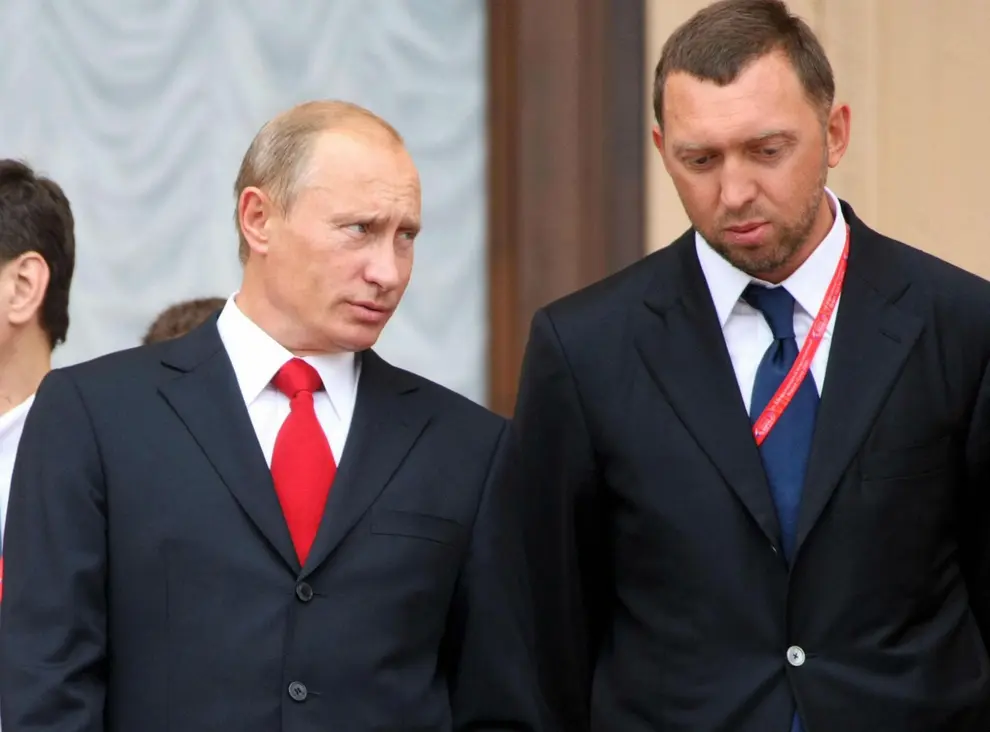Editor’s note: ImpactAlpha contributing editor Imogen Rose-Smith, a longtime senior writer for Institutional Investor, contributes a bi-weekly column on the policies, practices and strategies of the largest asset allocators, including pensions, foundations, and endowments. As Imogen says, she’s “tracking what investors do, not just what they say.”
ImpactAlpha, Apr. 11 – Russia, Russia, Russia, as former President Trump likes to say.
For institutional investors, thorny questions now include, Who is divesting from what? How to untangle from Russia, its leader Vladimir Putin and the oligarchs he enriched? What to do about minerals and other assets that are essential to the global economy? And what happens next?
As Western powers consider even tougher measures to punish Russia for alleged war crimes in Ukraine, a particular Russian asset that was the subject of an earlier round of sanctions provides a window into how such questions may play out.
The continued operation of this business raises questions over just how cozy Western interests should be with assets that are tainted by the corruption of Putin and those around him. Are improvements to the business, in both ‘E’ for environmental and ‘G’ for governance, enough to qualify it as an ‘ESG’ investment. Or does the giant ‘S’ for the social elephant in the room undermine any such effort?
After all, the core of the holdings of many oligarchs were originally stolen from the Russian people by a corrupt regime, and their wealth generation continues to support a government pursuing an illegal war of territorial aggression that has targeted civilians, including children, in an attempt to terrify a sovereign nation into submission.
Trying to straddle these contradictions is a veteran U.S. consultant who did stints at both the State Department and the United Nations before serving on Trump’s transition team – and who has emerged as a leading critic of ESG investing, which integrates environmental, social and governance factors.
Step forward Christopher Bancroft Burnham.
Burnham is charged with improving the governance of EN+ Group International PJSC, a Russia-based holding company publicly traded on the London Stock Exchange. Until 2018, EN+ was owned and controlled by Oleg Vladimirovich Deripaska, one of the oligarchs known to be closest to Putin, and whom the U.S. government has accused of having ties to organized crime in Russia. Deripaska disputes the findings.
EN+ owns a majority stake in the Russian aluminum company Rusal, the second largest provider of aluminum in the world.
On March 25, the board of EN+ elected Burnham, 65, previously one of the firm’s independent directors, as chairman of the board. Burnham also sits on the board of Rusal. For his services as a director, EN+ in 2020 paid Burnham a salary of $2 million.
Burnham is, to put it mildly, taking leadership amid controversy. Deripaska is under sanctions both in the U.S. and, now, in the U.K. Both EN+ and Rusal businesses also were under sanctions until January 2019, when the U.S. Treasury Department reached a controversial settlement agreement to lift the sanctions on Deripaska’s businesses, though not on him personally.
Deripaska still owns at least 44.95% of EN+, and has a sizable stake in Rusal. (His voting interest in EN+ is 35%.)
Not surprisingly, EN+ Global’s continued ties to a Russian oligarch under sanctions has attracted new scrutiny in the current climate, especially in the U.K. EN+ Global’s previous chairman, Lord Gregg Barker, a Tory peer, is stepping down. Barker, who was climate and energy secretary under Prime Minister David Cameron, has faced criticism, even from his own party, for his work with EN+. Conservative MP and Secretary of State for Defense Ben Wallace in February called on Barker to end his relationship with EN+.
But rather than stepping down in disgrace, or in protest over Russia’s invasion of Ukraine, Bloomberg News reports that Barker is set to head up a company that would spin out Rusal’s non-Russia aluminum assets as part of the ongoing effort to clean up both Rusal and EN+. In a Bloomberg interview, Lord Barker explained why he pursued the 2019 settlement agreement. It’s all about the workers (and the minority shareholders). Comrades!
As chairman of the board, it’s on Burnham to help oversee that spinout and related activities of EN+ and Rusal.
As part of the 2019 settlement, Burnham and other new board members were vetted by the U.S. Treasury Office of Foreign Asset Control, which noted that the companies “agreed to unprecedented transparency for Treasury into their operations by undertaking extensive, ongoing auditing, certification, and reporting requirements.” Apparently, no further approval was needed for Burnham’s promotion to chair.
Through an EN+ spokesman, Burnham declined a request for comment.
The politics of ESG
Sitting on the boards of Russian companies isn’t Burnham’s only gig.
In 2018, Burnham founded the Institute for Pension Fund Integrity, or IPFI, which he still chairs. The Washington D.C. based not-for-profit’s stated purpose is to keep politics out of pension-plan investment decision-making and protect the principles of fiduciary duty. Politically motivated ESG decision-making, the argument goes, weakens public pension plans, which are in poor fiscal shape and need all the investment help that they can get.
According to IPFI, “ESG factors should not dictate a political agenda for guiding public investment decisions.”
“Oftentimes outside interests have pressured pension funds and other entities to divest from certain investments under political pressures, which would subject pension funds to lower financial returns,” the organization states on its website. “This divestment would violate a pension fund’s fiduciary responsibility.”
IPFI’s 2018 report, “ESG Investing For Public Pensions: Does it Add Financial Value?” is critical of ESG investment at public plans.
Institutional Investor Magazine, which called IPFI a “dark-money lobbying group,” reported in 2019 that, “In practice, the organization primarily attacks divestment initiatives and environmental, social, and governance (ESG) programs.” IPFI is registered as a 501(c)(3) and not a lobbying organization.
So, as institutional investors flee Russian assets for political reasons, the head of an organization that has argued that fiduciaries should not be motivated by political ideologies is taking on the leadership of the board of one of the world’s most political hot potatoes.
Crimes in Crimea
Burnham seems to be typical of the characters that hang around in GOP, or for that matter, Democratic, circles. He has been through the revolving public-private sector door a good few times. IPFI moved its offices from Arlington, Va., to downtown Washington D.C., a stone’s throw from K-Street.
Back in the 1990s, Burnham served as Treasurer for the state of Connecticut, which made him, among other things, the sole trustee for that state’s public pension plan. After his service at the U.N. and as an assistant secretary of state in the George W. Bush administration, Burnham moved to Deutsche Bank as a private equity executive. As part of the Trump transition team, he worked alongside Rex Tillerson when the former ExxonMobil CEO became Trump’s Secretary of State. Becoming chair of a $500 billion Russian holding company is a significant career upgrade.
To understand how Burnham even got on the board of EN+ and Rusal, it is necessary to go back to an earlier act of Russian aggression, Vladimir Putin’s 2014 invasion of Crimea.
In response to that seizure of part of Ukraine, the U.S. in 2018, under the Trump administration, sanctioned various Russian dignitaries and businesses, including Deripaska, EN+ and Rusal, as well as a third company that the oligarch owned. The Treasury Department accused Deripaska of acting as a Russian agent
“Deripaska has said that he does not separate himself from the Russian state,” the Treasury Department said in announcing the sanctions. He has also acknowledged possessing a Russian diplomatic passport, and claims to have represented the Russian government in other countries.
Deripaska has been investigated for money laundering, and has been accused of threatening the lives of business rivals, illegally wiretapping a government official, and taking part in extortion and racketeering. Among other allegations: that Deripaska bribed a government official, ordered the murder of a businessman, and has had links to a Russian organized crime group.”
Deripaska also at one point hired the now-disgraced political operative Paul Manafort. It was to Deripaska that Manafort owed money when he went to work for Trump’s presidential campaign, for free. A Senate committee (led by Republicans) found that Manafort collaborated with Deripaska and other Russians throughout the 2016 election.
Lovely guy. At the time of the 2018 sanctions, Deripaska owned and controlled both EN+ and Rusal. EN+ had recently listed on the London Stock Exchange, or LSE.
The controversial settlement agreement of 2019 lifted the sanctions on Deripaska’s businesses, but not on him personally.
Under the terms of that agreement, Deripaska’s control and ownership stakes in the companies would be reduced to less than 50%, and Western leaders would be brought in as independent board members and chair.
The settlement agreement was spearheaded by Lord Barker, who had joined the EN+ board in 2017, shortly before its initial public offering (the 2017 listing of EN+ group was a big deal for the LSE, even if it now casts a dark shadow). A recruitment firm was used to identify prospective independent board members. Under the agreement, the Trump administration got to approve the proposed list. Burnham was one of the names picked.
Since then, Barker and Burnham, along with the other directors, have been working to help EN+ clean up its act.
Deripaska continues to fight the U.S. sanctions against him in court. Last month, his appeal was rejected by the Washington D.C. court of appeal. And the U.K. just sanctioned Deripaska (along with Chelsea Football Club owner Roman Abramovich and five other oligarchs) with regards to Russia’s invasion of Ukraine. Rusal and EN+ remain sanction-free.
ESG window dressing
Look, maybe it’s fine that the incoming chair of EN+ is a Trump transition team member heading up a group that has been critical of ESG who is making over $2 million a year for his service. Maybe tapping Burnham was just good governance.
The changes appeared to be having some effect, before Russia invaded Ukraine and the West responded with sanctions.
Both EN+ and Rusal talk a lot about sustainability and ESG and on their websites and in their public fillings. The holding company announced last year its ambition to reduce greenhouse gas emissions by at least 35% by 2030 and achieve net-zero by 2050. A section “for ESG investors” promises “to deliver transparent information to our stakeholders across the world” and reports its ESG risk rating from Sustainalytics (38.5, or ‘high’ risk) and ESG disclosure rating from Bloomberg (58.3, or third quartile). EN+ is keen to promote itself as a leader in low-carbon aluminum.
As recently as February 4, the ratings agency Fitch affirmed EN+ Group’s ‘B+’ rating with a “stable outlook.” Fitch gave En+’s corporate structure an ESG Relevance score of 5, meaning that ESG factors were very relevant to the credit rating, owing to its high debt (a result of the need to buy back shares as part of the 2019 settlement agreement). Fitch assigned an ESG score of 4 for management strategies and group structure. Fitch had assigned EN+ a BB- status with a stable outlook in July of 2019.
In EN+’s 2000 annual report, Burnham touts the board’s actions to improve the company’s governance, and how proud he is of that work. Let’s face it, the bar for improved governance is pretty low when your company has been sanctioned by the U.S. Treasury department, and was previously majority-owned and controlled by an oligarch who, according to the U.S. government, may or may not have had someone killed.
In mid March, Fitch announced that it was downgrading 11 Russian utilities, including EN+, to CC, citing debt servicing restrictions, as the world moves to cut Russia off from the global banking system. “EN+ Group’s assets and revenue generation are in Russia. All of its debt is (local-currency) denominated,” the ratings agency reported.
You can take the holding company out of Russia and its oligarchs, but you can’t take Russia and its oligarchs out of the holding company.
By stepping up to the plate is Burnham, and Lord Barker before him, normalizing an asset largely owned by one of the world’s most controversial oligarchs? Or are they cleaning up an otherwise dirty business? Does it matter that your largest shareholder is a sanctioned Russian businessman with close ties to the Russian president whose military is accused of human rights atrocities in Ukraine ?
And what does it mean that this cleanup is being done in the name of ESG?
Trump diaspora
Burnham is far from the only Trump acolyte to have taken issue with ESG.
Earlier this year, The Wall Street Journal had a fun story about Trump allies who are seeking to take advantage of the right-wing backlash against progressives by developing and promoting “anti-woke” ETFs. Among those featured were former economic advisor Kevin Hassett and Andy Puzder, the fast food executive who was going to be Trump’s Secretary of Labor until he withdrew his nomination, being too flawed even for the Trump Administration.
Far more serious than yet another way to separate the MAGA world from its dollars are the efforts among certain state legislatures to push through anti-ESG initiatives. The measures would force state pension plans to continue investing in coal and other fossil fuels.
In January, New Republic ran a depressing story entitled “The Conservative Plot Against Green Investment,” about how the coal lobby is pushing “cookie-cutter laws” in states such as West Virginia, which would prohibit the state from doing business with companies that “discriminate” against the fossil fuel sector.
IPFI, to its credit, has opposed these types of anti-ESG laws on the grounds that all of this messing around with ideologies weakens fiduciary duty. Last May, Burnham wrote to the Comptroller of Texas opposing similar legislation in that state.
The no-politics argument is not without its merits. But it overlooks the fact that sustainable investments (when done well) lead to better outcomes for all stakeholders and are, in fact, a net positive for fiduciaries. And not all politics are equal: one party tends to believe in things like science, climate change and paying a living wage for work; the other party does not.
Another front has opened in the ESG wars and powerful lobbyists from the energy industry and elsewhere are joining the fight. paying attention. Is the ESG industry, and those that support and promote it, truly ready for that? Or are we bringing a pencil to a gunfight?
IPFI was a big fan of the Trump administration’s full-frontal assault on ESG in the waning months of its term. The Department of Labor, under Secretary Eugene Scalia, pushed through a new rule to make it harder for fiduciaries of ERISA pension plans to direct assets to ESG funds. The Biden administration halted implementation of the Trump ERISA guidance and has since proposed its own rule.
I remember hearing David Blood, the founder with former Vice President Al Gore of the London-based $36 billion sustainable investment firm Generation Investment Management, at the GSG Summit in India in October 2019. He was very concerned about the anti-ESG forces amassing out there.
At the time, I thought Blood was being overly paranoid. We were winning. ESG was gaining traction and seeing real progress.
What was there to be worried about really? Some GOP hanger-on in Arlington, Virginia. Meh. Now, however, I’m not at all sure.
Meanwhile, in Pennsylvania
Not everyone who worked in the Trump administration is rabidly anti-ESG. After her stint as an economic and deputy national security advisor, Dina Powell returned to Goldman Sachs & Co., where she had worked previously. A member of the management committee Powell, is the firm’s global head of sustainability and inclusive growth, putting her in charge of Goldman’s ESG efforts.
It has not gone unnoticed in impact investing circles, that Powell’s husband, David McCormick, former CEO of the $223-billion Connecticut-based hedge fund Bridgewater Associates, is running in Pennsylvania’s Republican primary for an open seat in the U.S. Senate. McCormick is running a decidedly Trump-ed up campaign, including hiring former Trump advisors Hope Hicks and Steven Miller. (Despite these and other efforts Trump just endorsed McCormick’s opponent, Dr. Oz.)
What a spouse says and does for a living shouldn’t be assumed to be a reflection of that person’s partner’s beliefs and worldviews (cf. George and Kellyanne Conway.) But as New York pointed out in “Has Goldman Sachs’ Dina Powell Finally Gone Too Far?” Powell sure is putting in a lot of effort supporting her husband’s bid.
“Pennsylvanians are seeing quite a lot of Powell,” the magazine reports. “She appears in ads and B-roll footage, smiling in front of a barn and holding her husband’s hand while walking beside a river. He invokes her Trump administration bona fides — Trump liked her so much that he reportedly considered her for the U.N. ambassadorship, too — with voters as a way to burnish his own suspiciously globalist credentials as a onetime Jeb Bush supporter who worked for W. and ran a hedge fund, Bridgewater.”
ESG needs Republican supporters. It cannot, and should not, become the purview of only blue states and Democratic administrations (that’s what all those red state anti-ESG initiatives are about.) Powell certainly earned her impact credentials. At Goldman, she was working on impact investing initiatives long before it was cool to do so. She is a champion for women’s economic empowerment, founding Goldman’s 10,000 Women initiative to provide capital for women-owned businesses.
Defending Powell in the New York piece is Jonathan Greenblatt, CEO of the Anti-Defamation League and a former member of the Obama White House. The magazine notes that Powell is an “Arabic-speaking Egyptian who left the country when she was four years old because her family were Coptic Christians, a persecuted minority.”
Perhaps it’s good that Powell is banging the drum for sustainability while also spending time with her husband at Mar-a-Lago to kiss the ring or President Trump. But, as the political operatives say, the optics aren’t great.
Goldman declined to comment on Powell or her role at the firm.
Perhaps Powell can help Christopher Burnham sort out the issues at EN+ and Rusal. In accord with sanctions, Goldman, like other big banks, is winding down its business in Russia. But that doesn’t mean there isn’t money to be made. NBC News last month reported that Goldman is using a loophole in the sanctions to sell low-priced Russian debt to U.S. hedge funds.
Imogen Rose-Smith is a contributing editor at ImpactAlpha. A longtime senior writer for Institutional Investor, she was most recently a fellow in the Office of the Chief Investment Officer of the University of California.
Catch up on all of Imogen’s Institutional Impact columns.











